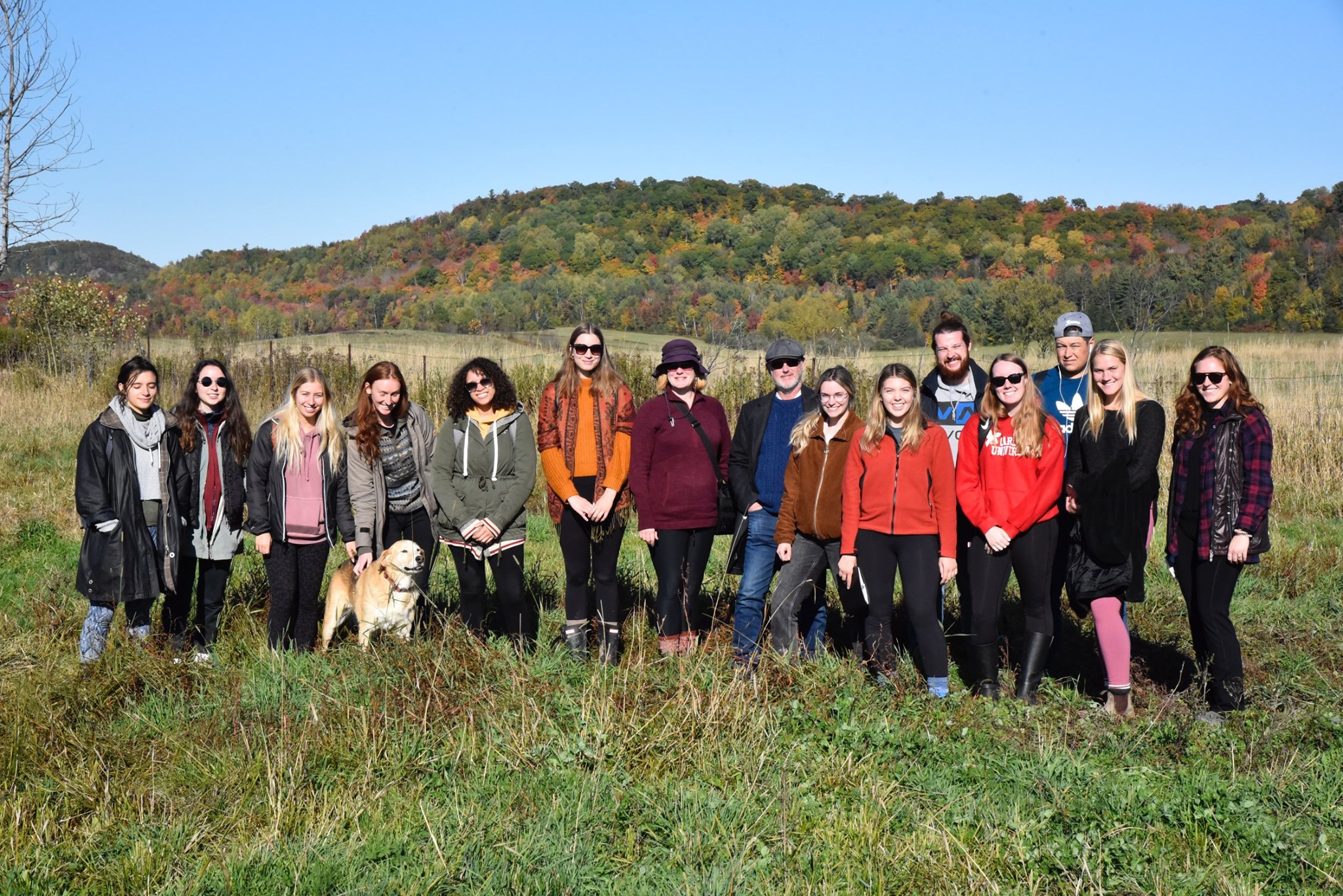
Students in Localizing Food Systems Field Course
GEOG/ENST 4007 (Special Topics in Geography & Environmental Studies)
Core Objectives of Localizing Food Systems Field Course
- To develop a deeper understanding of localizing food systems, using the Ottawa “foodshed” (eastern Ontario/ western Québec) as a case study;
- To understand the challenges and opportunities associated with local food systems;
- To experience various components of a food system, with a focus on community based initiatives;
- To perceive the social innovations and physical infrastructure required to build a just and vibrant sustainable local food system;
- To understand how discourses of local and sustainable and justice are invoked by different actors, and to what ends;
- To delineate between related concepts of food security, food sovereignty, and food justice;
- To explore the challenges faced by small- and medium-scale local producers; and,
- To consider global social movements present in Ottawa.
This class is a hybrid of compulsory field trips and seminars. Three compulsory regional field trips took place in the early fall. (Transportation provided.) There was also 4 x 3-hour seminars.
Undergraduate student Hannah Mae Henry explains why she values experiential learning as part of her education at Carleton University
On September 28th, John ApSimon kindly hosted students at the Gloucester Allotment Gardens, then Sun Shan and Bo LI of Chi Gardens, and Shelley Lambert and John Duimovich of Nanabush Food Forests, hosted us at the Just Food Farm. On October 5, students visited the Ottawa Farmers’ Market (Westboro location), BeetBox Farm, and Grazing Days. Lastly, on November 5th, students started out at the Parkdale Food Centre, moved onto the Green Door to share a meal together, then learned about aggregation and distribution of food at the Ottawa Food Hub, and about scaling up production at the Ottawa Incubator Kitchen.
Student Feedback from ENST 4007 (Localizing Food Systems) Fall Term
- “Experiential learning catalyzes real change in the lives of students. It’s a great way to include more hands-on learning in a university degree, and it gets students engaged in a way that classroom teaching just can’t compare to.” [ENST Major]
- “To me, this class was extremely important and valuable. I am a hands-on learner, and to be able to go out and see what is going on first hand in local food systems is amazing! This experience has really ignited my passion and reminds me what I love about this degree.” [ENST Major]
- “Taking part in experiential education has been fantastic in allowing me to see and explore what’s out there, and get a taste of things I normally wouldn’t have access to.” [GEOG Major]
- “The value of experiential education has been critical for my understanding of food systems. Getting out into the field has taught me different skills and a new appreciation for farmers, helping me to become more grateful for my food.” [ENST Major]
- “Value of experiential education: much more interesting and contextualizes information; the opportunity to ask questions to presenters is invaluable; seeing things instead of just hearing about them is far more memorable; getting a ‘behind the scenes’ look at different venues was interesting.” [ENST Major]
- “Experiential learning has been an incredibly valuable method of learning as it is engaging and really solidifies core themes and ideas of the course, and contextualizes them in real-world learning experiences. I always learn a lot from courses with components such as experiential learning, or labs, and I find myself retaining knowledge indefinitely versus memorizing and forgetting later.” [ENST Major]
- “I feel very grateful to have been able to experience these field trips. I practiced new skill sets, and the hands-on approach is something I thrive in and learn best from.” [ENST Major]
- “This is the first class in university that I have had the pleasurable experience of experiential education. To be honest, I didn’t know how much I needed it, and how crucial I now think it is to a well-rounded educational experience. Experiential education takes what you are learning in the classroom, and shows you real-life examples of it. It gives something new to experience and be excited for. This has by far been one of the best courses in university that I’ve taken!” [ENST Major]
- “The value of this course cannot be adequately explained here. I have always been a proponent of this style of teaching.” [GEOG Major]